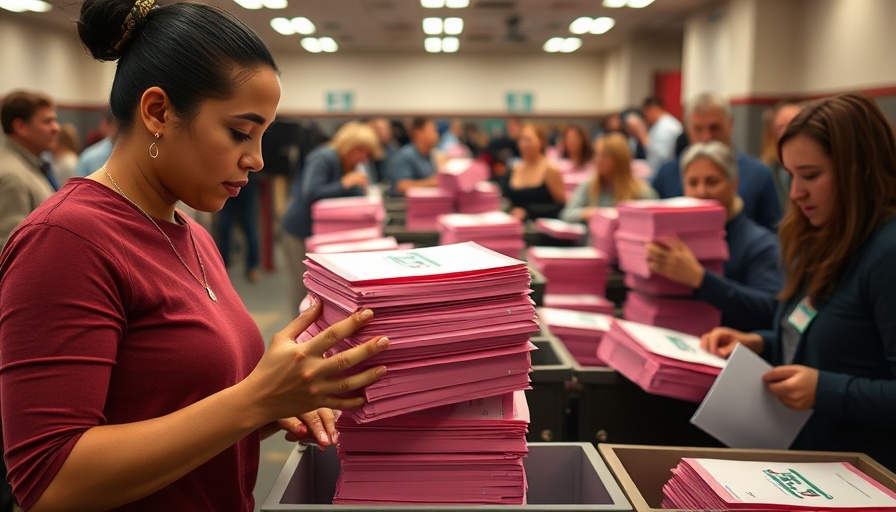
California's New Law: Marking the Path to Swift Election Results
As California moves forward with a new law aimed at expediting election outcomes, residents are left pondering the implications for their voting experiences. For years, slow vote counts have frustrated many, especially as national elections often bring extreme scrutiny of California's lengthy processes. This ongoing discussion emerges from a vital question: can ballots be counted quicker without compromising election integrity?
The Evolution of Voting in California
The transformation of California’s voting practices has had profound effects on election timelines. These drastic shifts began in earnest in 2002 with the introduction of no-excuse absentee voting, which blossomed during the COVID-19 pandemic into a system that mailed ballots to every active registered voter. This year, additional laws solidified these changes, reinforcing a state culture centered around enhanced voting access.
However, this embrace of mail-in ballots has naturally slowed the counting process, leading some to call for urgent reforms. Politicians and election officials agree that understanding this backdrop is pivotal; expediency cannot come at the cost of accuracy and trust. Yet, the status quo is becoming increasingly contentious.
Insights from Legislative Changes Nationwide
California is not alone as it grapples with the challenge of speeding vote counts. Other states, including Wisconsin, Arizona, and Nevada, are tackling similar issues, reflecting a broader national conversation about electoral efficiency. Many legislators argue that quicker election results can alleviate misinformation's traction, as public patience wanes during drawn-out vote counts, especially when eyes turn toward competitive districts.
Assemblymember Marc Berman encapsulated this sentiment perfectly, noting, “At a time when a lot of people are lying to the public to try to sow doubt in our democracy, that makes it that much more important for us to be as transparent as possible.” Transparency could be the key to rebuilding the public’s trust in the electoral process.
Local Voices: What Residents Want
In places like Bakersfield, the anticipated quickening of results could lead to a renewed sense of engagement and participation among voters. Many locals have expressed frustrations stemming from the extended waiting periods for election outcomes, particularly during pivotal elections. County election officials, like those in San Joaquin and Contra Costa, highlight the need for educational campaigns to encourage voters to return their ballots earlier. Faster counts could potentially increase engagement and bolster voter confidence, both crucial in the fight against misinformation.
How Accessibility Plays a Role
Another important factor woven into the fabric of this debate is accessibility. The balance between speed and ensuring that every eligible voter can participate in the process is delicate. As NPR pointed out, the mail-in voting system has made it easier for individuals to vote, as evidenced by California's recent statistics during the pandemic that indicated a high rate of mail-in participation.
Yet, these innovations bring challenges. Studies show that those states prioritizing mail-in voting inherently take longer to report results. Some lawmakers suggest implementing faster rules for counting, while others emphasize that any change must keep access at the forefront of discussions.
Analyzing Recommendations for Improvement
As policymakers navigate these discussions, local election authorities are exploring various strategies for improvement. Some election offices are ramping up public awareness campaigns to encourage voters to return ballots sooner. Others are advocating for budgetary support to enhance infrastructure and staffing within elections offices.
In neighborhoods across Bakersfield, maintaining the integrity of the process requires resources. Enhancements in technology, such as better ballot processing equipment, could lead to dramatic shifts in efficiency. When combined with a robust outreach strategy, these advancements may create a new normal for elections in the Golden State.
Looking Ahead: The Future of Voting in California
The call for a swift vote-counting process is leading to a reconsideration of how California conducts elections. As residents, we must be aware of both the necessity for speedy processing and the demand for thoroughness. The upcoming elections will test this balance, and engaged citizens will play a pivotal role in determining their future. Our choices today will ultimately shape the landscape of democracy in California — and all of us must take part.
As Bakersfield prepares for these changes, it’s crucial for voters to stay informed and active in their communities, ensuring that their voices are heard. If you believe in a transparent, accessible election process, now is the time to advocate for your rights and push for reforms that put citizens first. Your vote isn’t just a number; it’s your voice in democracy.
For further insights, stay connected with local news sources and participate in local forums discussing upcoming electoral changes.
 Add Row
Add Row  Add
Add 



Write A Comment